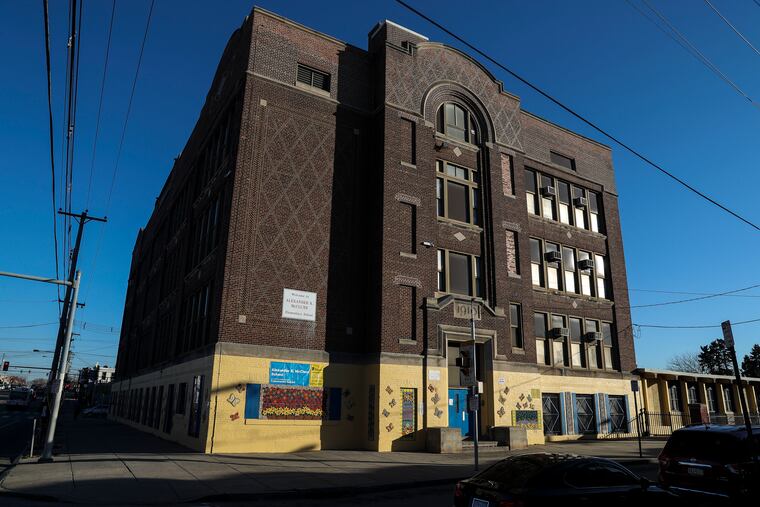New asbestos contamination closes McClure Elementary for a second time
Two days after reopening, the Hunting Park school has closed due to health concerns.

District officials were forced to abruptly close a North Philadelphia elementary school Friday morning after new air tests revealed elevated levels of asbestos fibers.
The emergency decision came two days after McClure Elementary reopened, following a days-long asbestos cleanup that had shuttered the building Dec. 19. District officials assured teachers and parents on Thursday that the school was safe, but additional air tests, taken late Thursday evening, proved otherwise.
District officials notified parents of the school’s closure at about 6 a.m. Friday, leaving parents to scramble for child care.
“Two air samples came back slightly elevated. As a result, McClure will remain closed today for additional cleaning and further testing to ensure student and staff safety," the district wrote in a statement.
Just a day earlier, district officials had questioned why leaders of the Philadelphia Federation of Teachers (PFT) were insisting that McClure stay closed until further testing was done. “The district is unclear as to why the PFT continues to raise questions and, in some cases, seek school closures after tests confirm schools are safe for re-occupancy," school officials stated Thursday. "The district remains committed to the safety and education of our children.”
The debacle further eroded trust in the district’s ability to safeguard students and teachers from asbestos hazards in dozens of aging schools across Philadelphia. The district has closed six schools since the start of school due to asbestos hazards.
“We feel that this calls into question a lot of the work that was done in the school and a lot of the information provided by the School District,” McClure school nurse Emily Seiter said Friday. “We work really hard to have these close relationships with parents and by coming into the building yesterday, we had all these conversations with parents about whether or not the school was safe and I relayed the information provided by district officials. Now we know that we should not have trusted the School District and any trust that parents had in the district has been completely destroyed.”
Jerry Roseman, the PFT’s environmental scientist, called the district’s repeated failures to control asbestos a “big concern.”
“Protocols are lacking and they are lacking across the district everywhere," Roseman said. “It bit McClure this time. This is the downside of the lack of controls, and we are actually talking about something real here and that is exposure to a carcinogen.”
The School District hired Pepper Environmental Services to remove and patch damaged asbestos at McClure on Jan 2. The district also hired an environmental firm, Synertech, to monitor Pepper workers and conduct air testing, district documents show.
>> READ THE AWARD-WINNING SERIES: Toxic City: Sick Schools
The district had paid those same firms to do asbestos removal work at Benjamin Franklin High and Science Leadership Academy, which was abruptly shut down in early October, prompting the relocation of some 1,000 students, after Pepper and Synertech missed potential asbestos hazards. The error resulted in contractors disturbing asbestos that should have been removed prior to the project’s start.
Asbestos is not considered a hazard when in good condition, but when it becomes damaged, tiny fibers can be released into the air and can cause cancer when inhaled.
As the school year began in early September, union leaders and district officials disclosed that a longtime elementary schoolteacher, Lea DiRusso, was diagnosed with mesothelioma, a rare and deadly asbestos-linked cancer. She taught at two South Philadelphia schools with asbestos hazards for nearly 30 years. That news touched off a wave of concern among teachers and parents. Then, problems with exposed asbestos during the renovation at Ben Franklin-SLA, which closed on Oct. 1, heightened that anxiety and fueled anger.
In December, McClure teachers asked Roseman and the district’s environmental manager to walk through the building and check for damaged asbestos. They found several troubling areas, and the district closed McClure.
Environmental crews with Pepper and Synertech got work at McClure, removing 1,100 feet of asbestos pipe insulation in hallways and stairwells, district documents show.
Air tests cleared the building for occupancy, but during a final walk-through with staff on Tuesday — one day prior to the scheduled reopening — teachers noticed that an entrance to the attic, which was supposed to have been sealed because of asbestos contamination, was breached. The attic had been slated for asbestos cleanup at a later date.
Synertech agreed to take air samples in a room adjacent to the attic that was used for aftercare and extra student instruction. Those test results, which came back Wednesday morning, documented elevated levels of airborne asbestos.
District officials closed off the room Wednesday night and said additional testing just outside of the now-sealed contaminated space came back safe for occupancy. But Thursday, during a tense, daylong meeting, teachers and union leaders pushed district officials to take air samples in parts of the building that had not been tested.
Federal rules require the district to conduct thorough asbestos inspections of schools every three years, and a visual inspection every six months. The school closures have highlighted hazards that environmental inspectors either failed to note or the district let sit.
Synertech declined comment. Pepper did not return a phone call from The Inquirer.